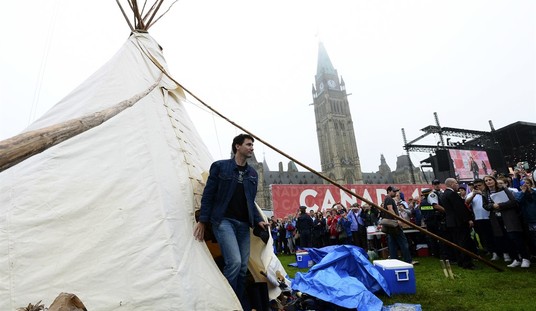The big story of the Massachusetts special election was so small it flew in under the radar of the old boy networks and their allies in the legacy media.
As Glenn Reynolds wrote way back in 1999 — prefiguring locally what is happening now on a national scale — “The powers-that-be aren’t anymore.” When Tennessee poobahs tried to ram through higher taxes that year, opponents “simply bypassed the traditional gatekeepers in the media and took their case directly to the people. The people responded.”
That’s what happened in Massachusetts yesterday. Republican Scott Brown and his “Army of Davids” bypassed the gatekeepers who would have us believing the Democrat establishment’s hand-picked candidate, Martha Coakley, was a shoo-in. The citizens were mad as hell and weren’t going to take it anymore. And thanks to the viral nature of social networks like blogs, Facebook, and Twitter, they started to find and encourage each other to create an “intelligent crowd” that took its first baby steps in the tea parties and town halls of last year. They then found their voices in embracing Scott Brown’s long-shot candidacy during the whirlwind six weeks between his primary win on December 8 and the January 19 special election.
As Jonathan Hoenig wrote about the tea partiers when we were just getting started last April, “They’re angry about the taxes, yes, but they’re really angry about the philosophy behind the taxes, and that’s collectivism.” This is a point consistently lost upon Northeast Corridor elites from both sides of the aisle, who fiddled while Rome burned, amusing each other by dissing us as lunatic-fringe “teabaggers.”
Blogging was my own gateway to the tea party movement. A former armchair activist, I ventured into the blogosphere first as a visitor just before 9/11 and then as an active participant a couple of years later. Here was a way to say what was on your mind and reach like-minded — and sometimes dislike-minded — souls out there in cyberspace. Links from other blogs, large and small, extended your audience, and some of the people you met through blogging would become good friends.
Then came the 2008 presidential election, and things turned serious. You watched in horror as the Obama juggernaut mobilized to ram a collectivist nightmare down the American people’s throat. By then, you’d become an obsessive twitterer with over 1,000 followers, a purveyor of what Jordan Raynor calls “crowd-sourced journalism.”
You were able to spread the word almost instantaneously from your own followers to your followers’ followers — a smart mob self-organizing to pursue a shared goal. Driven by a visceral fear that the lights were about to go out on the shining city upon a hill, thousands of believers in American exceptionalism began to apply the online social-networking skills they had developed as amateurs in the virtual struggle.
Starting December 9, the day after Scott Brown’s primary victory, bloggers like myself and Cornell Prof. William A. Jacobson of Legal Insurrection took Bill Kristol’s idea to make Scott Brown’s race a “referendum on Obamacare” and ran with it. We both communicated directly with the campaign through Facebook and Twitter. We burst out of our virtual worlds from time to time to help get out the vote by phone banking at regional offices. At campaign headquarters in Needham one day, Jacobson was actually kicked off the phone because he was spending too much time on Twitter! Blogging and twittering our on-the-ground experiences, from phone banking to informal exit polling, fired up our readers — from Massachusetts and around the country and beyond — to contribute and volunteer.
The campaign itself was totally social-networking savvy. As New York Times columnist Ross Douthat wrote, Brown “used Internet fundraising to put the fear of God into” the old boy network. If you were from out of state or unable to come in to one of the regional offices to phone bank, they had the technology to allow you to make calls from home.
Like-minded big-time bloggers like Glenn Reynolds of Instapundit and Michelle Malkin showered Prof. Jacobson, myself, and others with links. The message had gone viral, and the comments and tweets poured in, a groundswell of tea party fever that would bring in dollars and volunteer time to get out the vote and help sweep our long-shot candidate to an astonishing 52-to-47 percent victory. One in five Democrats supported Brown, “who benefited from high suburban turnout,” according to a Rasmussen Reports poll, enough of an edge so the Beacon Hill machine couldn’t cheat.
“Winning is fun,” fellow blogger-in-arms Dan Riehl of Riehl World View twittered on victory night, and the “beauty of New Media is getting local perspective.” Indeed, the ability of bloggers like Prof. Jacobson and others to use social-networking tools to share our experiences instantaneously with tea party sympathizers across the country is akin, perhaps, to the way Radio Free Europe was once used to give hope to oppressed peoples behind the Iron Curtain.
No longer dependent upon legacy media to tell our story, we are able — in Prof. Reynolds’s formulation — to disintermediate the old boy networks via the internet.









Join the conversation as a VIP Member